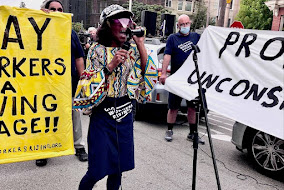DoorDash: Lawsuit from the City of Chicago due to divisive tipping policy (May 2019)
Case Controversy
As of September 2021, DoorDash is the largest food delivery service in the United States, delivering
57% of the United States’ food delivery orders in September. However, prior to July of 2019 DoorDash had
been using a deceptive tactic in terms of their tipping policy to pay less out
of pocket to their drivers. This policy
was not only taking away tip money from drivers but was also making it so that
DoorDash had to pay less base salary per delivery and would profit even more
off of each order. Since November of 2019,
they have changed this policy to allow tips to be on top of the base salary,
rather than a direct part of it.
 |
| DoorDash Drivers knock on CEO's door to protest wages |
This would lead to DoorDash changing its tipping policy
over the course of July to November of 2019.
Rather than subsidizing tips into base payment, they would follow the
traditional method of tips being on top of base salary. The new tipping policy ensured that “Dashers
wouldn't earn less as a result of customers not tipping, DoorDash increased the
amount it chipped in per delivery. The company now pays $2 to $10 per delivery
out of its own pocket to cover the minimum payment.” (Fortune.com) After this change, there were
multiple lawsuits regarding the previous tipping policy, and paying the drivers
for tipping money that was subsidized up to that point.
 |
| Attorney General Karl Racine |
 |
| Chicago Mayor Lori Lightfoot |
Stakeholders
The
stakeholders involved with the DoorDash case would be the DoorDash as a
Company, Employees of DoorDash, Previous Consumers of DoorDash, Future Customers
with DoorDash, Future Shareholders, and the General Public. The delayed actions of DoorDash to change
their policy will affect how their employees and the general public view them
in the future. Prior to the change of
policy, it was reported that 80% of DoorDash workers prefer the old pre-2019
model over the pre-2017 model, the pre-2017 model being nearly identical to the
new one. A statement from DoorDash also
says that “Since we implemented our pay model in 2017, Dasher satisfaction has
increased while average delivery times have fallen.” (DoorDash
Spokesperson) These two factors will
heavily affect how stakeholders view this situation, as the change back to the
earliest policy goes against what the majority of employees want. The future customers of DoorDash are affected
by this as they now have to read through the new policies, and likely will have
higher prices to even out the amount of money lost by DoorDash without tip
subsidization. In terms of future
shareholders, they have to consider these policies as well, and since DoorDash
was very delayed in changing these policies until they were forced to, how will
they handle events such as these in the future.
The general public is affected as DoorDash currently holds 57% of the
online food delivery service orders, and this impacts a large number of people
around the United States. How these
stakeholders are affected and the ties to Utilitarianism with this are
explained in the next section.
Individualism
Individualism as it pertains to
DoorDash, Friedman’s individualism where “the only goal of business is to
profit, so the only obligation that the business person has is to maximize
profit for the owner or the stockholder within the law of the land.” Applying
this to DoorDash we can see how the company was using the extra tips to cover
the losses they are taking on the mandated tip rate. This is unethical, the
employee is entitled to at least know they are losing out on the tip and make a
choice if they would want to continue to work for DoorDash instead of thinking
they are getting fair treatment. The customer is also entitled to know that
if a tip is required then where directly is the money going. To mislead someone
so drastically by advertising you are tipping the driver when it's really you’re covering the losses the company has placed on themselves clearly falls
into the impermissible category. Regarding Machan’s Individualism “the only
direct goal of business is to profit, and the primary obligation of the
business person is to maximize profit within the law but: the direct goal of
profiting may need to be met by indirect goals and not aimed at profiting,
business people may have other goals and those goals may at times be
prioritized over the goals of profit-maximizing.”
The impacts the DoorDash lawsuits by
the business should worry about the profits yes, but also worry about employees
and customers, it may come as a loss but are you a company of enough morals to
look at these potential losses and say it’s better for us to lose the tip money
or lose the customers and employees. To an extent, DoorDash should be concerned
with the profit and the return they are receiving. The company had every
opportunity to come clean and say they made a mistake and grew too big to
continue this guarantee. Instead, they decided to try and cover it secretly.
They gambled and lost. Was it more important to cover a deal they offered to
employees or the respect and moral integrity of the company? With these
impermissible acts, they are facing a more drastic loss, the customer.
Utilitarianism
A utilitarian
would view this situation as the least ethically beneficial, including how
DoorDash handled it and the situation itself.
The primary goal of utilitarianism is happiness for the majority of all
parties involved. To specifically quote
the ethical rule of utilitarianism, “Business actions should aim to maximize
the happiness in the long run for all conscious beings that are affected by the
business action.” (Salazar 19) Salazar (19) also notes that “The basic method
is to analyze the costs and benefits of a particular course of action.” In the case of DoorDash, the happiness of all
groups was not maximized, but rather the opposite, which includes the following
groups:
DoorDash
Company: DoorDash in ultimately every sense
lost in this scenario, due to the many different factors involved in this
situation. They had to give up over $100
million in lawsuits during this course of time, had to change their policy on
tipping subsidization which makes them less money, and lost future customers
and employees due to their lack of change until they were required to do
so. The slow initiative of DoorDash to
pay their workers more, which is still ongoing as of November 2021, will harm
them in the long term financially and in terms of future employment opportunities.
Employees
of DoorDash: While the tipping policy
was reversed so that now tips are not included in base pay, this will likely
negatively impact the employees long term.
The settlement by DoorDash to give money back to the employees only gave
roughly $130 to each member, which is much more than the tipping amount that
was subsidized (DoorDash Class Settlement)
This also negatively impacts DoorDash employees in the future, as the
prior 2017-2019 policy was preferred by 80% of employees, so this does not
maximize their happiness.
Customers
of DoorDash: The previous customers of
DoorDash will not have maximized happiness with this situation, as their tips
were not given to the drivers in the normal sense. The customers would be tipping to show
appreciation to the driver for them bringing their food, not to subsidize their
base pay and pay off their salary. Then
in terms of future customers, they would have to deal with potential price
heightening from DoorDash, which has already been reported by the Chicago
lawsuit, to cover for the tipping money they are not subsidizing.
Future
Shareholders: Future shareholders would
have trouble trusting the company first off, due to their delayed fixing of
company policies regarding tipping. This
also applies to the currently pending lawsuit against DoorDash for their policies,
and the potential loss of employees and customers gradually over time. The future of the company, especially with
the new policy that the majority
Kantianism
Kantianism is based on making and
respecting ethical, rational decisions. Ethics is a sense of what is right and
remaining loyal to those who work from you and purchase from you. This also
means that the person themselves is not above the law or being ethical.
Kantianism is in a sense “practice what you preach” what you would preach is
making smart and ethical choices based on facts and reasons while helping
others to do the same.
Kantianism
was not followed when comparing it to the DoorDash tipping policy. The first
thing that shows that it does not follow the theory is the ethics part of the
theory. Keeping a tip that was promised to someone when you are a
billion-dollar company I would argue is extremely unethical. As already stated,
these delivery drivers usually do not make a lot of money delivering orders to
the customers, so those tips are highly important to them and their livelihood.
Another reason why Kantianism would find this impermissible is that DoorDash is
not letting its customers make a rational choice when it comes to tipping.
Kantianism is big on helping others make rational choices with all the right
information available to them. If DoorDash is giving their customer, the right
to tip their delivery driver on the app the customer is under the impression
that the driver is the one receiving the tip they are giving. This was
obviously not correct and was misguiding the customer to tip DoorDash
themselves and not the person handling their order. This is not letting the
customer make a rational choice since they do not have accurate information
on where the tip would be going. Overall, The DoorDash tipping controversy will
be deemed unethical by Kantianism.
Virtue
Theory
A Virtue Theorist would look at the
way DoorDash handled this situation as ethical. In the views of Virtue Theory,
for a business to be ethical they must focus more on the process of getting the
goal rather than strictly caring about achieving the goal. With the old tipping
model, DoorDash would be considered very unethical according to those 4 virtues.
With the Courage Virtue, it is
important to find the middle ground between rashness and cowardice. DoorDash
took a risk by not giving out the maximum amount of money to their workers.
DoorDash was seeking to maximize their profits which a company should be
striving to do so but by taking money out of their worker's pockets is not a
good middle ground to settle in. The new tipping policy gave DoorDash room to grow
in the Courage Virtue by finding a good middle ground of a larger tip will not
decrease the base pay paid by DoorDash.
When it comes to the Honesty Virtue
it is key to be transparent with the public about the treatment of employees,
customers, business partners in all aspects of the business. By unknowingly
using tips to pay some of the base pay, this allows DoorDash to pay out less
money to workers in return making them more money. The only issue is DoorDash
wasn’t telling people that’s how it worked, they were working in silence. This
is the biggest change DoorDash had when it came to the new policy. The
settlement forcing DoorDash to be completely transparent with their workers and
consumers allows them to put them back on the ethical side of the Honesty
Virtue.
The Temperance Virtue is to have reasonable desires and expectations. I think in this case DoorDash has reasonable desires when it comes to them seeking to maximize the money made for the company but their expectations of taking tips away from drivers would never fit into any business model. The Temperance Virtue is the only virtue DoorDash really didn’t change after the settlement because their desires and expectations had nothing wrong with them.
The Justice virtue is hard work,
quality products, good ideas, and fair practices. The employees of DoorDash
were very hard workers and produces quality products but the practices done on the end of the company were unfair. Taking tips away from people is the same as
taking money out of their pocket. Knowingly doing this to your employees is
wrong. After the settlement, DoorDash had improved the Justice Virtue to become
much more ethical than before. The new tipping policy shows good new practices
compared to their old bad ones.
Action
Plan
The
current issue displayed by DoorDash, in this case, is that they are being
extremely unethical towards their employees and customers in a multitude of
ways. Firstly, the subsidization of tips
to pay for their employees base wages, without notifying them that this is what
they were doing. This also impacts their
customers, as the tips they are giving are intended to go to the driver
directly for exemplary service, not just to pay their base salary. To truly acknowledge this issue, DoorDash
needs to be able to admit that they were using deceptive payment methods to
their drivers, which they still have not done.
The choice to take accountability for what they did will show that DoorDash
is aware of what they did and will give them the image they hope to have in
that they have responsibility for their actions. Next, they would need to pay reparations to
those employees affected by this, and they should receive the sum amount of
tips taken and used towards their base pay.
This would be the most surefire way to show the company has evolved and
would prove that they care about the employees over profit.
The next step would be a rebrand of
the company, firstly starting with their mission statement. Their mission statement currently says, “We're
working to empower local communities and in turn, creating new ways for people
to earn, work, and thrive. We believe in delivering goods by connecting people
and possibility.” (DoorDash). There are a few ways this mission statement
can be improved after the case, one of which is adding a section regarding
deceptive tactics. A new example of such
would be, “We’re working to empower local communities and in turn, creating new
ways for people to earn, work, and thrive.
We believe in delivering goods by connecting people and possibility,
while also using fair and honest values to do so.” This new mission statement is not a far cry
from the initial, however, it shows they are focusing on the addition of fair
and honest methods to help their company thrive.
The new core values for them to
follow are commitment, honesty, fairness, respect, and accountability. To improve upon the company, DoorDash will
have to be committed to finding a way to improve the company standards and help
their employees thrive, not just the company.
They will need to be honest, and make sure employees clearly understand
how they are being paid, and customers understand where their tip money
goes. They will need to change their
policy on this payment method to further benefit the employees for their hard
work, and make sure tips are directly being used for their initial intent. Fairness to employees is a huge issue and
can be addressed the same way, as the employees are not being treated fairly
compared to other delivery services due to this case. Respect and accountability finally, which
come from DoorDash admitting to their deceptive tactics and building a new
future to improve the lives of all people involved. If they can go above and beyond by not just
improving the company, but also the employees’ and customers’ experiences, then
they can truly move forward from this case.
To prevent this from happening
again, they should focus on fully implementing the new tipping utilization so
that it is never used for base wages again.
They should focus on creating new rules within the company to prevent
any more deceptive tactics from forming, and whichever employees can stick to this
and come up with a way of doing so can receive promotion. Training would also be beneficial as it would
allow employees of DoorDash itself to understand how to be open and clear with
the drivers and customers while still being helpful.
All of this will help promote profit
and productivity, as it is enticing customers to tip so DoorDash will still be
paying the base amount but there will likely be more orders. With this, more drivers will apply to the
company and take more orders, making the company profit, and increasing their
outreach. This conforms to the mission
statement and core values as it is honest and being respectful of those who
work for the company, and is fair to all employees across their network, which
also ensures good ethics.
Authors:
Jeremy Trottier, Brian Wiener, Owen Stanton, Ryan Suprin, Grace Trembley
References
-Dickey,
Megan Rose. “DoorDash Tipping Practices Prompts Lawsuit from DC Attorney
General.” TechCrunch, TechCrunch, 19 Nov. 2019, https://techcrunch.com/2019/11/19/doordash-tipping-practices-prompts-lawsuit-from-dc-attorney-general/
-EntreCourier, Author. “Doordash Taxes Made Easy: A Complete
Guide for Dashers.” EntreCourier, 4 Oct. 2021, https://entrecourier.com/delivery/delivery-contractor-taxes/how-taxes-work/doordash-taxes/
-Rapier, Graham. “DoorDash Uses a Shady Tactic That Stiffs
Workers out of Some Tips and Customers Are Furious.” Business Insider, Business
Insider, 22 July 2019, https://www.businessinsider.com/doordash-delivery-tipping-practices-under-fire-cash-2019-7
-Tran, Sheila. “The Ethical Delivery Dilemma.” SF Weekly, 9
Apr. 2021, https://www.sfweekly.com/dining/ethical-delivery-app-dilemma-food/
-Canales, Katie. “DoorDash Is Paying $2.5 Million to Settle a
Lawsuit That Accused the Food Delivery Company of Stealing Drivers' Tips.”
Business Insider. Business Insider, November 25, 2020. https://www.businessinsider.com/doordash-25-million-settlement-lawsuit-tipping-model-2020
-Ghaffary, Shirin. “Pressure Is Mounting on Food Delivery App
Doordash to Change Its Controversial Tipping Policy.” Vox. Vox, March 8, 2019. https://www.vox.com/2019/3/8/18253378/doordash-tipping-food-delivery-gig-economy-worker-rights
-Kelso, Alicia. “DoorDash Settles Lawsuit over Old Tipping
Model for $2.5M.” Restaurant Dive, November 25, 2020. https://www.restaurantdive.com/news/doordash-settles-lawsuit-over-old-tipping-model-for-25m/589702/
-Kerr, Dara. “DoorDash Settles Lawsuit for $2.5m over
'Deceptive' Tipping Practices.” CNET. CNET, November 25, 2020. https://www.cnet.com/tech/mobile/doordash-settles-lawsuit-for-2-5m-over-deceptive-tipping-practices/


No comments:
Post a Comment